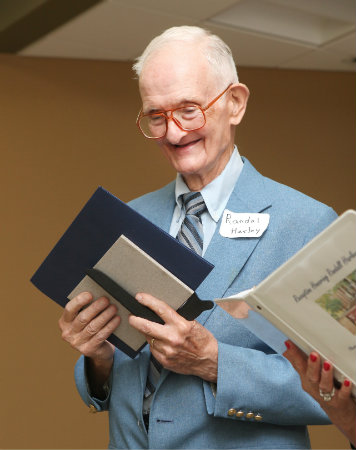
Randall Kirkwood Harley Jr., professor of special education, emeritus, at Vanderbilt Peabody College of education and human development, died on Jan. 15. Harley, 92, had been receiving care at Alive Hospice in Nashville.
Harley, a native Nashvillian, was born on Nov. 30, 1927. He played the trombone in big bands during high school and college. Harley earned a bachelor of science in mathematics from Middle Tennessee State University in 1949. He was a junior high school teacher before serving in the U.S. Army during the Korean War. After the war, he earned both a master of arts in education administration and a doctorate in special education (specializing in education for the visually impaired) from George Peabody College for Teachers.
Harley was a teacher and principal at the North Carolina School for the Blind before returning to Peabody in 1964 as a faculty member in the Department of Special Education. He was one of the first faculty members at what is now called the Vanderbilt Kennedy Center.
“Randall Harley made many significant contributions to Peabody and Vanderbilt special education teaching and research with his renowned scholarship in the field of visual impairment education,” said Joseph Wehby, associate professor of special education and department chair. “Randall’s methods for teaching Braille have been adopted throughout the United States and around the world. Most important, he was a terrific role model and mentor for students and colleagues who will never forget his deep concern for others—especially those facing disabilities, discrimination and other life challenges.”
At Peabody, Harley was awarded more than 40 federal grants from the U. S. Department of Education to develop exemplary graduate degree training programs to prepare professionals to work with persons with visual impairments. A Nashville Banner article featured his role in a Peabody program to train teachers of the blind to use an Optacon, an electromagnetic device that converts printed images into electronic signals.
Harley’s many publications included Visual Impairment in the Schools, which he edited and co-authored. The third edition was published in 2000.
Early in his career, he spent a year as a visiting professor at the University of Sri Lanka. He also loved the many summers he spent in rural West Virginia, training teachers how to teach the blind. Harley’s honors included the Outstanding Service Award from the National Accreditation Council.
Harley became an emeritus professor in 1993. In 2012, he was honored during a campus reception with a stone to be placed in the Hall of Legends at the American Printing House for the Blind.
“Dr. Harley’s contribution to the profession of special education and services for children with visual impairments is immeasurable,” said Christopher J. Craig, deputy provost at Missouri State University and a former student of Harley. “What he uniquely brought to the table was his profound compassion, kindness and guiding principles that have made a difference in the lives of all those who worked or studied with him.”
Harley’s community service reflected his belief in serving those who had been marginalized by society. His volunteer activities during retirement included teaching disabled adults and helping the homeless at Room in the Inn.
He was preceded in death by his wife, Jayne Robinson Harley, and grandson, Raymond Ketting Jr. Harley is survived by his three children: Jim Harley, Tom Harley and Lydia Ketting; nine grandchildren; and two great-grandchildren.
A celebration of life is scheduled for 11 a.m. Saturday, Jan. 18, at the Nashville Inner City Church of Christ.